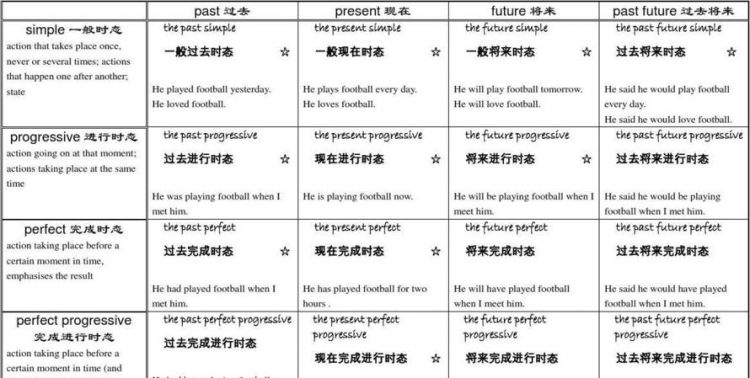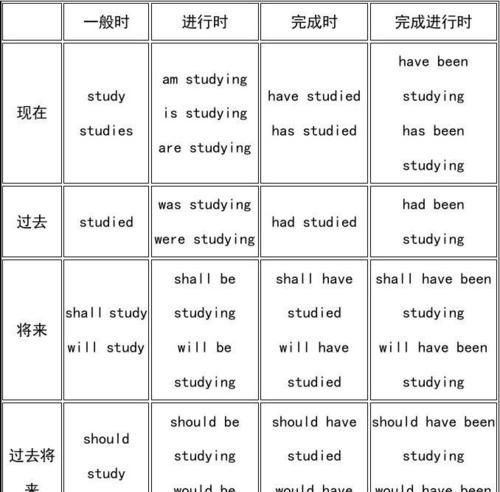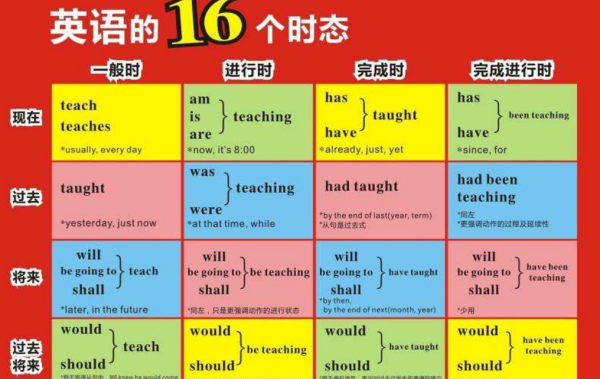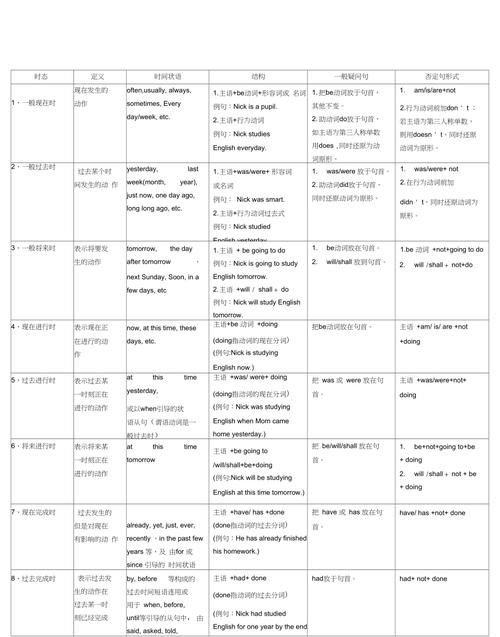本文目录
英语里有几个时态,每个时态都是什么
英语共有16种时态,主要有:完成时态——现在完成时、过去完成时、将来完成时;进行时态——现在进行时、过去进行时、将来进行时、完成进行时;一般时态。

英语中一共有多少种时态分别是什么
16个时态中,常用的有12个:一般现在时、一般过去时、一般将来时、过去将来时、现在进行时、过去进行时、将来进行时、现在完成时、过去完成时、将来完成时、现在完成进行时和过去完成进行时.其他时态很少单独使用.
1、一般现在时
通常以动词原形表示.主语为第三人称单数时,用现单三形式.
动词be和have(表示“拥有”)各人称的单数形式为:
\x09第一人称单数 \x09第二人称单数 \x09第三人称单数
Have \x09Have \x09Have \x09Has
Be \x09Am \x09Are \x09is
一般现在时的否定式、疑问式和简单回答形式如下:
动词be 与 have(表示“拥有”):否定式直接把not放在动词之后,疑问式直接把动词放在主语之前,见下表:
否定式 \x09疑问式
Be \x09Have \x09Be \x09Have
I am not (I’m not)… \x09I have not (haven’t)… \x09Am i…? \x09Have i…?
You are not (aren’t)… \x09You have not (haven’t)… \x09Are you…? \x09Have you…?
He is not (isn’t)… \x09He has not (hasn’t)… \x09Is he …? \x09Has he …?
动词be 的否定疑问式和简单回答:
否定疑问式 \x09肯定回答 \x09否定回答
Am I not (aren’t i)…? \x09Yes, you are. \x09No, you aren’t
Are you not (aren’t you)…? \x09Yes, I am. \x09No, I’m not.
Is he not (isn’t he)…? \x09Yes, he is. \x09No, he isn’t
动词be 与 have(表示“拥有”):否定式直接把not放在动词之后,疑问式直接把动词放在主语之前,见下表:
否定式 \x09疑问式
Be \x09Have \x09Be \x09Have
I am not (I’m not)… \x09I have not (haven’t)… \x09Am i…? \x09Have I …?
You are not (aren’t)… \x09You have not (haven’t)… \x09Are you …? \x09Have you…?
He is not (isn’t)… \x09He has not (hasn’t)… \x09Is he …? \x09Has he …?
动词have(表示“拥有”) 的否定疑问式和简单回答:
否定疑问式 \x09肯定回答 \x09否定回答
Have I not (haven’t i)…? \x09Yes, you have. \x09No, you haven’t.
Have you not (haven’t you)…? \x09Yes, I have. \x09No, I haven’t.
Has he not (hasn’t he)…? \x09Yes, he has. \x09No, he hasn’t.
注意:have 作为行为动词则只能按照行为动词的规则变化.
行为动词(以study为例)一般现在时的否定式、疑问式和简单回答(注意要加助动词do/does)
否定式 \x09疑问式
I do not (don’t) study \x09Do I study
You do not (don’t) study \x09Do you study
He does not (doesn’t) study \x09Does he study
否定疑问句式 \x09简单回答(肯定/否定)
Do I not (Don’t I) study…? \x09Yes, I do. No, I don’t.
Do you not (Don’t you) study…? \x09Yes, you do. No, you don’t.
Does he not (Doesn’t he) study…? \x09Yes, he does. No, he doesn’t.
2、现在进行时
由助动词be + 现在分词构成.其中be有人称和数的变化,有三种形式:第一人称单数用am, 第三人称单数用is, 其他用are.
现在进行时的否定式是:直接在助动词be后面加上not;疑问式是:把助动词be提到主语之前.以study 为例:
否定式 \x09疑问式
I am not studying \x09Am I studying?
You are not studying, \x09Are you studying?
He is not studying. \x09Is he studying?
5、一般过去时
一般过去时通常由动词过去式表示.一般过去时的否定式、疑问式和简单回答形式要用助动词do 的过去式did, 同时注意实义动词要用原形.以study 为例,其否定式、疑问式和简单回答形式如下:
否定式 \x09疑问式
I did not (didn’t) study…. \x09Did I study…?
You did not (didn’t) study…. \x09Did you study…?
He did not (didn’t) study…. \x09Did he study…?
否定疑问式 \x09简单回答 (肯定/否定)
Did I not (Didn’t I) study…? \x09Yes, you did. No, you didn’t.
Di you not (Didn’t you) study…? \x09Yes, I did. No, I didn’t.
Did he not (Didn’t he) study…? \x09Yes, he did. No, he didn’t.
6、过去进行时
由助动词be 的过去式 + 现在分词构成.其中be有人称和数的变化,第一、第三人称单数用was,其他用were.
1)过去进行时动词主要表示在过去某一时刻或某一段时间内正在进行或持续进行的动作.过去进行时经常与过去时配合使用.例如:
This time yesterday, we were having an English lesson. 昨天这个时候,我们正在上英语课.
The teacher was giving us a lesson when Tom walked into the room. 老师在给我们上课时,汤姆走进教室.
While we were having supper, all the lights went out. 我们吃饭的时候,灯灭了.
He was reading while she was setting the table. 她摆桌子时,他在读书.
It was getting dark. The wind was rising. 天渐渐黑下来了.风势增强了.
2)过去进行时动词常用always, continually, frequently 等词连用,表示过去经常发生的行为.这种用法表明带有的感情色彩.例如:
The two brothers were frequently quarreling when they were young. 两兄弟小时候常吵架.
In Qing Dynasty, China was always making concessions to western powers. 清朝时,中国总是对西方列强妥协.
7、过去完成时
一律用had + 过去分词构成.
用法:
1)表示发生在过去某一时间或动作之前的事情,即“过去的过去”.用过去完成时,必须有一个过去的时间或动作来作参照,说明在此之前某事已发生.如果两个动作都是在过去发生的,先发生的用过去完成时,后发生的用一般过去时.例如:
She told me she had been there three times before. 她告诉我她以前到过那里三次.(“去过”发生在“告诉”之前)
How long had he taught here by the end of last term? 到上学期末为止,他在这里教学多长时间啦? (“教学”发生在上学期末结束之前)
When we arrived, the football match had already begun. 我们到的时候,足球赛已经开始了.
She had visited China twice before she came this year. 她今年来中国之前已访问过中国两次了.
2)过去完成时动词可以表示过去某一时刻之前发生的动作或呈现的状态,这一动作一直持续到过去这一时刻或将继续下去.例如:
By the middle of last month, I had lived in Beijing for five years. 到上月中旬,我已在北京住了五年了.
By six o’clock they had worked for eight hours. 到六点为止,他们已工作八小时了.
When I came to Shanghai, he had been there for a long time. 我到上海时,他在那里很长时间了.
3)过去完成时动词常用于间接引语和虚拟语气,我们以后会详细讲述.
4)此外,过去完成时常用于 no sooner…than… 和 hardly(scarcely) …when… 这两个句型,前面部分用过去完成时,后面部分用一般过去时.例如:
No sooner had he stolen the purse than he was caught red-handed. = He had no sooner stolen the purse than he was caught red-handed. 他刚偷到钱包就被当场抓获.
Saddam had hardly realized what was happening when he was captured. = Hardly had Saddam realized what was happening when he was captured. 萨达姆还没有意识到在发生什么事情就被抓获了.
8、过去完成进行时
had been + 动词的现在分词.
用法:表示一直持续到过去某个时间的行为动作,此行为动作或刚结束、或还没结束(可以从上下文看出).这一时态经常与一般过去时一起使用.例如:
When he came in, I had been trying to repair the TV for a couple of hours. 他进来的时候,我一直在努力修理电视机好几个小时了
The roads were dangerous. It had been raining for two whole days. 道路很危险.雨一直下了两整天.
They were tired because they had been digging since dawn. 他们累了,因为从天亮开始他们就一直在挖.
The boy was delighted with the new mountain bike. He had been hoping for one for a long time. 那男孩得到一辆新山地自行车很高兴.很长时间来他一直希望有一辆.
9、一般将来时
一般将来时动词表示将来发生的动作或情况.主要有以下几种表现形式:
(1)shall/will + 动词原形
表示单纯的将来,不涉及主语的主观意愿.第一人称I, we用shall 或will,其余用will. 其否定式、疑问式和简单回答形式如下:
否定式 \x09疑问式
I shall/will not study…. \x09Shall I study…?
You will not study…. \x09Will you study…?
He will not study…. \x09Will he study…?
否定疑问式 \x09简单回答(肯定/否定)
Shall I not (shan’t i) study…? \x09Yes, you will. No, you won’t.
Will you not (Won’t you) study…? \x09Yes, I shall/will. No, I shan’t/won’t.
Will he not (Won’t he) study….? \x09Yes, he will. No, he won’t.
例如:
I shall be twenty years old next year. 我明年二十岁.
The sky is black. I think it will rain. 天黑下来了.我想可能会下雨.
You will meet him at the station this afternoon. 你下午会在车站碰到他.
The train will arrive soon. 火车快要到了.
When shall we see you next time? 我们下次什么时候能看见你呢?
He probably won’t go with us. 他大概不能和我们一起去.
注意:
1)shall, will的缩写形式为’ll, 如I’ll, you’ll, he’ll 和she’ll等.
2)will 用于第一人称时,可以表示将来的意愿、决心、允诺、命令等;shall用于第二、三人称时,可以表示说话人的将来的意愿.例如:
I will give you a new pen for your birthday. 我将送你一支新钢笔作为生日礼物.(允诺)
I will take the college entrance examination. 我将参加大学入学考试.(决心)
Shall I open the window? 我打开窗户好吗?(征求允诺)
You shall have the book as soon as I get it. 我一拿到书就给你.(说话人的允诺)
The enemy shall not pass. 决不让敌人通过.(说话人的保证)
I will do my best to help you. 我愿意尽力帮助你.(意愿)
Nobody shall be late for the meeting. 任何人开会都不能迟到.(说话人的命令)
(2)be going + 动词不定式
1)这种结构表示主体现在打算在最近或将来要做某事.这种打算往往是事先考虑好的.例如:
My brother is going to learn English next year. 我哥哥准备明年学英语.
I am going to meet Tom at the station at six. 我六点钟要到火车站去接汤姆.
She is not going to be there. 她不会到那儿去的.
When are you going to finish your work? 你的工作什么时候做完?
He is going to stay a week. 他准备呆一星期.
We are going to call a meeting to discuss it. 我们准备开个会来讨论一下.
2)这种结构还可以表示说话人根据已有的迹象认为非常可能即将发生某事.例如:
Look at these black clouds?it is going to rain. 看这些乌云?要下雨了.
I think it is going to snow. 我看要下雪.
I am afraid I am going to have a bad cold. 恐怕我要得重感冒.
10、将来进行时
shall/will be + 现在分词
用法:将来进行时动词表示在将来某一段时间内将会发生的动作.
This time next week we shall be working in that factory. 下星期这时候,我们将在那个工厂劳动.
When I get up tomorrow morning, my mother will be getting breakfast for me. 当我明天早晨起床时,我妈妈将在为我准备早饭.
I will be seeing him next month. 我下个月将要见他.
Tomorrow we will be going to the village fair. 我们明天去赶集.
We will be taking our holiday at the seaside in July. 七月份我们要去海边度假.
一般将来时与将来进行时都表示将来,那么如何区别一般将来时和将来进行时呢?将来进行时不表示个人意愿,强调主观上感觉某事即将发生,并对这一事情有着期待,感情色彩较浓,强调动作.一般将来时主要是对某一事情即将发生做一个事实性的说明或陈述,强调事实或意愿.
11、过去将来时
(1)由should/would + 动词原形构成.第一人称用should; 第二、三人称用would.美国英语所有人称一律用would. should/would 的简略形式为’d, 如I’d, you’d; would not 和should not的简略形式分别为wouldn’t 和shouldn’t.
(2)过去将来时表示从过去某时间看将要发生的事情,多用在宾语从句中.还可以表示过去的倾向或过去经常发生的事情.如:
They asked me if I would go to Guangzhou soon. 他们问我是否很快要去广州.
She told me she would come again next week. 她和我说她下周还来.
I told him to leave immediately, but he wouldn’t. 我告诉他马上离开,但他不.
He’d play the violin when he was in low spirits. 他情绪低落的时候,就拉小提琴.
When I was in college, I would find a part-time job during the summer holidays every year to earn my tuition. 我上大学的时候,每年暑假都找份临时工挣学费.
(3)其他表示过去将来时的结构:
12、将来完成时
shall/will + have + 过去分词
用法:将来完成时动词主要表示在将来的某一时刻或将来的某一时刻之前完成的动作,这一动作也可能继续进行.例如:
By seven o’clock this afternoon we shall have got to Shanghai if the train keeps good line. 如果火车运行正常,我们今天下午七点就到上海了.
Before bedtime Xiao Ming will have completed his work. 到上床睡觉的时候,小明会做完他的工作(或作业).
By February next year this foreign expert will have been here on this job for five years. 到明年二月,这个外国专家在这儿做这项工作就满五年了.
By Sept. 2008 Beijing will have held/hosted the Olympic Games. 到2008年9月,北京将举行完了奥运会.

英语一共有多少种时态
一共有十六种时态:一般现在时,一般过去时,一般将来时,一般过去将来时;现在进行时,过去进行时,将来进行时,过去将来进行时;现在完成时,过去完成时,将来完成时,过去将来完成时;现在完成进行时,过去完成进行时,将来完成进行时,过去将来完成进行时。常见的时态有:

一、 现在时:
1、一般现在时:经常、反复发生的动作或行为某种状况。
时间状语:always,usually,often,sometimes,every week (day,year,month…),once a week,on Sundays
基本结构:动词 原形 (如主语为第三人称单数,动词上要改为第三人称单数形式)
否定形式:am/is/are+not;此时态的谓语动词若为行为动词,则在其前加don't,如主语为第三人称单数,则用doesn't,同时还原行为动词。
一般疑问句:把be动词放于句首;用助动词do提问,如主语为第三人称单数,则用does,同时,还原行为动词。
例句:
It seldom snows here.
He is always ready to help others.
Action speaks louder than words.
2、现在进行时:表示现阶段或说话时正在进行的动作及行为。
时间状语:now,at this time,day
基本结构:be+doing
否定形式:be+not+doing
一般疑问句:把be动词放于句首。
例句:
How are you feeling today?
He is doing well in his lessons.
3、现在完成时:
完成时的这种用法通常与由since或for引导的时间状语连用。如:
The old man has lived here for more than twenty years.
老人已在此住了20多年了。
4、完成进行时:表示从过去某一时间开始一直延续到的动作。这一动作可能刚刚开始,也可能仍在继续,并可能延续到将来。
基本结构:have/has +been+doing
时间状语:since+时间点,for+时间段等。
例句:
I have been sitting here for an hour.
The chirdren have been watching TV since six o'clock.
二、过去时:
1、一般过去时:过去某个时间里发生的动作或状态;过去习惯性、经常性的动作、行为。
时间状语:ago,yesterday,the day before yesterday,last week,last(year,night,month…),in 1989,just now,at the age of 5,one day,long long ago,once upon a time,etc.
基本结构:be动词;行为动词的过去式
否定形式:was/were+not;在行为动词前加didn't,同时还原行为动词。
一般疑问句:was或were放于句首;用助动词do的过去式did 提问,同时还原行为动词。
例句:
She often came to help us in those days.
I didn't know you were so busy.
2、过去进行时:表示过去某段时间或某一时刻正在发生或进行的行为或动作。
时间状语:at this time yesterday,at that time或以when引导的谓语动词是一般过去时的时间状语等。
基本结构 s+was/were+doing
否定形式:s+was/were + not + doing.
一般疑问句:把was或were放于句首。(第一个字母大写)
例句:
At that time she was working in a PLA unit.
When he came in,I was reading a newspaper.
3、过去完成时:以过去某个时间为标准,在此以前发生的动作或行为,或在过去某动作之前完成的行为,即“过去的过去”。
时间状语:before,by the end of last year(term,month…),etc.
基本结构:had + done.
基本结构:主语+had+过去分词(done)
①肯定句:主语+had+过去分词+其他
②否定句:主语+had+not+过去分词+其他
③一般疑问句:Had+主语+过去分词+其他
④特殊疑问句:特殊疑问词+一般疑问句
否定形式:had + not + done.
一般疑问句:had放于句首。
例句:
As soon as we got to the station,the train had left.
By the end of last month,We had reviewed four books
三、将来时:
1、一般将来时:表示将要发生的动作或存在的状态及打算、计划或准备做某事。
时间状语:tomorrow,next day(week,month,year…),soon,in a few minutes,by…,the day after tomorrow,etc.
基本结构:主语+am/is/are+going to + do;will/shall + do.
否定形式:am/is/are not going to do ;will/shall not do。
一般疑问句:be放于句首;will/shall提到句首。
例句:
They are going to have a competition with us in studies.
It is going to rain.
2、将来进行时:
将来进行时表示将来某一时间正在进行的动作。常表示已安排好之事,给人一种期待感。如:
What will you be doing this time tomorrow?明天这个时候你将做什么?
The train will be leaving in a second. 火车马上就开。
3、将来完成时:
将来完成时表示在将来某一时间之前完成的动作,往往对将来某一时间产生影响。如:
I shall have finished reading the book by the end of this week.我将在本周末前读完这本书。
Before long,he will have forgotten all about the matter.过不久,他很快就会把这件事全然忘记。
将来完成时表示持续到将来某时的动作或状态。如:
By the time he graduates,he will have studied French for four years.到他毕业的时候,他学法语就满四年了。
By the time Pierce comes back from the meeting,we will have waited here for three hours.到皮尔斯开会回来的时候,我们已经在这儿等了三个钟头了。
4、过去将来时:
过去将来时表示过去某时之后将出现的情况,通常用于宾语从句中。如:
I thought he would come. 我以为他会来。
Jenny never imagined that she would become a doctor.詹妮从没想到自己会当医生。
表示从过去某时看将要发生的事情。如:
The old lady was fifty-eight then. In two years she would be sixty.老太太当时五十八岁,再过两年就六十了。
I didn’t think they would have any objection to it.我想他们不会有什么反对意见。
表示过去习惯性动作(不管什么人称都用would)。如:
Whenever he had time,Harris would go to see his grandmother.哈里斯一有时间就去看他奶奶。
Joanna would go for a walk aftershe had supper.乔安娜吃完晚饭总要去散步
英语有哪几种时态
英语共有16种时态,根据近几年曝光的四、六级考卷分析,时态测试重点主要有:完成时态——现在完成时、过去完成时、将来完成时;进行时态——现在进行时、过去进行时、将来进行时、完成进行时;一般时态.
一、一般时态
1、一般现在时
(1)一般现在时表示没有时限的持久存在的动作或状态或现阶段反复发生的动作或状态,常和副词usually,often,always sometimes, regularly,near,occasionally,every year, every week等连用.例如:
1)The moon moves round the earth..
2)Mr. Smith travels to work by bus every day.
(2)在由after,until,before,once,when,even if,in case,as long as,as soon as,the moment以及if,unless等引导的时间状语从句或条件状语从句中,通常用一般现在时代替将来时.例如:
1)I will tell him the news as soon as I see him.
2)I will not go to countryside if it rains tomorrow.
(3)某些表示起始的动词,可用一般现在时表示按规定、计划或安排要发生的动作,这类动词有:be,go,come,start,depart,arrive,begin,leave等.例如:
1)The plane leaves at three sharp.
2)The new teachers arrive tomorrow.
(4)在由why,what,where,whoever,who,that,as等引导的从句中,也常用一般现在时代替将来时.例如:
1)Free tickets will be given to whoever comes first.
2)You’ll probably be in the same train as I am tomorrow.
2.一般过去时
(1)表示过去某一特定时间所发生的、可完成的动作或状态,常与表示确切过去时间的词、短语或从句连用.例如:
We went to the pictures last night and saw a very interesting film.
(2)表示过去习惯性动作.例如:
1)He always went to class last.
2)I used to do my homework in the library.
(注意与be used to doing短语的区别)
3.一般将来时
1)表示将来打算进行或期待发生的动作或状态.例如:
I shall graduate next year.
2)几种替代形式:
1)be going to +v在口语中广泛使用,表示准备做或将发生的事情.例如:
I’m going to buy a house when we’ve saved enough money.
2)be to +v表示计划安排要做的事,具有“必要”的强制性意义.例如:
I am to play tennis this afternoon.
3)be about to +v表示即将发生的事情.例如:
He was about to start.
4)be due to +v表示预先确定了的事,必定发生的事.例如:
The train is due to depart in ten minutes.
5)be on the point/verge of +v – ing强调即将发生的某种事态.例如:
The baby was on the point of crying when her mother finally came home.
二、进行时态
1.现在进行时
(1)表示现在正在进行的动作,常与now,right now,at the mother,for the time being,for the present等连用.例如:
Don’t disturb her. She is reading a newspaper now.
(2)表示现阶段经常发生的动作,常与always,continually,forever,constantly等连用.例如:
My father is forever criticizing me.
(3)表示根据计划或安排在最近要进行的事情.具有这种语法功能的动词仅限于过渡性动词.即表示从一个状态或位置转移到另一个状态或位置上去的动词.常用的有:go,come,leave,start,arrive,return等.例如:
They are leaving for Hong Kong next month.
(4)有些动词不能用进行时,这是一类表示“感觉,感情,存在,从属”等的动词.如:see,hear,smell,taste,feel,notice,look,appear,(表示感觉的词);hate,love,fear,like,want,wish,prefer,refuse,forgive(表示感情的动词);be,exist,remain,stay,obtain(表示存在状态的动词);have,possess,own,contain,belong,consist of,form(表示占有与从属的动词);understand,know,believe,think,doubt,forget,remember(表示思考理解的动词).但是如果它们词义改变,便也可用进行时态.例如:
1)Tom looks pale. What’s wrong with him?
(look在此为联系动词,意为“显得,看上去”)
2)Tom is looking for his books.
(look在此为实义动词,意为“寻找”)
2.过去进行时
过去进行时表示一个过去的动作发生时或发生后,另一个过去的动作正在进行,或表示过去反复的习惯,常与always,continually,constantly等动词连用.例如:
1)We were discussing the matter when the headmaster entered.
2)Whenever I visited him, he was always writing at the desk.
3.将来进行时
将来进行时主要表示将来某一时刻正在进行的动作,或表示要在将来某一时刻开始,并继续下去的动作.常用来表示礼貌的询问、请求等.例如:
1)This time next day they will be sitting in the cinema.
2)What will you be doing at six tomorrow evening?
4.完成进行时
(现在、过去、将来)完成进行时是(现在、过去、将来)完成时的强调形式,将放在完成时态部分讲述.
三、完成时态
完成时态通常表示已完成或从事的动作.它可分为:
1.现在完成时
(1)现在完成时用来表示对目前状况仍有影响的,刚刚完成的动作(常与yet,already,just连用),或者过去某一时刻发生的,持续到现在的情况(常与for,since连用).例如:
1)I have just finished my homework.
2)Mary has been ill for three days.
(2)常与现在完成时连用的时间状语有:since, for, during, over等引导出的短语;副词already, yet, just, ever, now, before, often, lately, recently等;状语词组this week (morning, month, year), so far, up to now, many times, up to the present等.例如:
1)I haven’t been there for five years.
2)So far, she hasn’t enjoyed the summer vacation.
3)There have been a lot of changes since 1978.
(3)完成时态可用在下列结构中:
This (That, It) is (was) the first (second…) time +定语从句;This (That, It) is (was) the only (last) + n +定语从句;This (That, It) is (was) +形容词最高级+ n +定语从句.如果主句的谓语动词是一般现在时,从句的谓语动词通常用现在完成时;如果主句谓语动词是一般过去时,从句谓语动词通常用过去完成时.例如:
(1)This is one of the rarest questions that have ever been raised at such a meeting.
(2)There was a knock at the door. It was the second time someone had interrupted me that evening.
2.过去完成时
(1)表示过去某时间前已经发生的动作或情况,这个过去的时间可以用by,before等介词短语或一个时间状语从句来表示;或者表示一个动作在另一个过去动作之前已经完成.例如:
1)We had just had our breakfast when Tom came in.
2)By the end of last year they had turned out 5, 000 bicycles.
(2)动词expect, hope, mean, intend, plan, suppose, wish, want, desire等用过去完成时,表示过去的希望、预期、意图或愿望等没有实现.例如:
I had meant to take a good holiday this year, but I wasn’t able to get away.
另外两种表示“过去想做而未做的事”的表达方式是:
1)was / were + to have done sth,例如:
We were to have come yesterday, but we couldn’t.
2)intended (expected, hope, meant, planned, supposed, wished, wanted, desired) + to have done sth,例如:
I meant to have told you about it, but I forgot to do so.
(3)过去完成时常用于以下固定句型:
1)hardly, scarcely, barely + 过去完成时+ when + 过去时.例如:
Hardly had I got on the bus when it started to move.
2)no sooner +过去完成时+ than +过去时.例如:
No sooner had I gone out than he came to see me.
3)by (the end of ) +过去时间,主句中谓语动词用过去完成时.例如:
The experiment had been finished by 4 o’clock yesterday afternoon.
3.将来完成时
将来完成时表示在将来某一时刻将完成或在另一个未来的动作发生之前已经完成的动作;也可以用来表示一种猜测.常与将来完成时连用的时间状语有:by (the time / the end of ) +表示将来时间的短语和句子;before (the end of ) +表示将来时间的词语或句子;when, after等加上表示将来动作的句子等.例如:
1)By this time tomorrow you will have arrived in Shanghai.
2)I shall have finished this composition before 9 o’clock.
3)When we get on the railway station, the train will probably have left.
4.完成进行时
完成进行时是完成时的强调形式,有现在完成进行时,过去完成进行时,将来完成进行时.
(1)现在完成进行时表示过去某一时刻之前开始的动作或状态一直延续到过去某一时刻.例如:
I have been looking for my lost book for three days, but I still haven’t found it.
(2)过去完成进行时表示过去某一时刻之前开始的动作或状态一直延续到过去某一时刻.例如:
It had been raining cats and dogs for over a week and the downpour had caused landslides in many places.
(3)将来完成进行时表示在将来某一时刻之前开始的一个动作或状态一直延续到将来某一时刻.例如:
By the time you arrive tonight, she will have been typing for hours.
四:时态一致
时态一致是英语四、六级考试的一个重要内容.通常应由主句谓语的时态决定从句的谓语时态.一般原则是:
1、当主句谓语使用现在时或将来时,从句的谓语根据具体情况使用任何时态
He says that he lives in Wuhan.
We hope that there will be many people at your party today.
“Did you hear that Bill finally sold the house?” “Yes, but I don’t know who bought it.”
“There’s a lot of excitement on the street.”
“There certainly is. Do you suppose the astronauts have returned?”
2、当主句谓语使用过去时的时候,从句的谓语必须使用过去范围的时态
He said he was writing a novel.
The teacher wanted to know when we would finish the experiment.
He said his father had been an engineer.
3、当从句是表示没有时间概念的真理时,从句的谓语应使用一般现在时.例如:
The teacher told them since light travels faster than sound, lightning appears to go before thunder.
注:在此种情况下,即使主句谓语用了过去式的各种时态,从句谓语也应用一般现在时.
4、从句谓语只能用虚拟语气的情况
利用时态一致原则确定从句动词时态时,还应注意,若主语动词是表示命令、请求、要求、建议、劝告等的动词,从句谓语只能用虚拟语气,不能遵循时态一致原则.例如:
We insisted that we do it ourselves.
动词的语态
语态也是动词的一种形式,英语有两种语态:主动语态和被动语态.主动语态表示主语是动作的执行者,而被动语态表示主语是动作的承受者.
1)We use electricity to run machines. (主动语态)
2)Electricity is used to run machines. (被动语态)
1.不能用于被动语态的动词和短语
(1)在英语中,不及物动词不能用于被动语态,但有些不及物动词(包括短语)容易引起误用.如:appear, belong, belong, die, escape, fall, happen, last, remain, succeed, occur, come true, take place, consist of.
(2)某些表示状态或特征的及物动词,如:become, contain, cost, fit, have, resemble, suit也没有被动语态.
2.被动语态的时态形式
常用的被动语态有表1所列的几种时态形式.
表1
时?SPAN lang=EN-US> 一般时 进行时 完成时
现在 am asked am being asked
is asked is being asked
are asked are being asked
过去
was be asked was being asked
were be asked were being asked
将来 shall be asked shall have been asked
will be asked will have been asked
过去 should be asked should have been asked
将来 would be asked would have been asked
3.短语动词的被动语态
短语动词转换为被动语态时,通常被看作是一个动词,后面的介词或副词不能拆开或省略.例如:
1)So far no correct conclusion has arrived at.
2)All the rubbish should be got rid of.
4.“get + -ed分词”的被动语态
“get + -ed分词”结构强调动作的结果,而非动作本身,常用来表示突发性的,出乎意料的偶然事件.例如:
The boy got hurt on his way home from work.
另外,“get + -ed分词”还可用于谈论为自己做的事,是主动的行为而不是被动的行为.例如:
get dressed(穿衣服) get divorced(离婚)
get engaged(订婚) get confused(迷惑不解)
get lost(迷路) get washed(洗脸)
get married(结婚)
5.能带两个宾语和复合宾语的动词改为被动语态
(1)能带两个宾语的动词改为被动语态时,一次只能由一个宾语作主语,另一个宾语被保留下来.例如:
1)We showed the visitors our new products.(主动语态)
2)The visitors were shown our new products.(被动语态)
3)Our new products were shown to the visitors.(被动语态)
(2)能带复合宾语的动词改为被动语态时,原来的宾语补足语变为主语补足语.例如:
1)The teacher appointed him League secretary.(主动语态)
2)He was appointed League secretary.(被动语态)
6.被动语态与系表结构的区别
(1)The novel was well written.(系表结构)
(2)The novel was written by Diskens.(被动语态)
7.少数动词的主动语态有时有被动的意思
例1:The book is selling remarkably well.
例2:The song sounds very beautiful.
能这样用的动词还有read(读起来),clean(擦起来),wash(洗起来),write(写起来).
例3:My watch needs cleaning. (= My watch needs to be cleaned).
能像need这样用的动词还有:want, require, deserve, do, owe, bind等.
例4:The meat is cooking.
例5:The book written by the professor is printing.

以上就是关于英文有多少个时态,英语里有几个时态,每个时态都是什么的全部内容,以及英文有多少个时态 的相关内容,希望能够帮到您。

